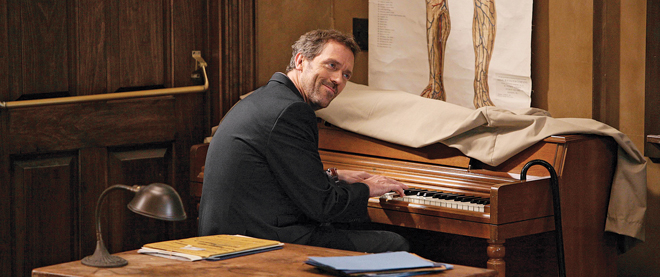Let them talk. House can sing.
Hugh Laurie’s knowledge of the blues rivals his alter-ego doctor’s medical expertise
Adam Taylor/FOX
Share

In the packed, neo-Gothic Union Chapel in north London, Hugh Laurie sits onstage at a piano, introducing the solemn blues song Six Cold Feet in the Ground. His guitarist, Toronto’s Kevin Breit, starts laughing so hard at Laurie’s wisecracks that he screws up his prelude to the tune—twice.
Some months later, over the phone from the L.A. set of House, Laurie expresses pride at this achievement. “He’s a very talented guitarist, so to make him make a mistake is not easy. Normally you’d need a baseball bat and some sort of flame-throwing device.”
Comedy isn’t much of a stretch for Laurie—before becoming America’s highest-paid TV drama actor, Laurie was probably best known for playing haplessly optimistic characters in Rowan Atkinson’s TV series Blackadder. His musical accomplishment, however, is truly surprising: Laurie’s new blues album, Let Them Talk, on which he plays piano and guitar and sings in a resonant, slightly gruff baritone, is no joke.
Laurie is a long-standing blues fan who, as a boy growing up in Oxford, England, was introduced to the style by his older brother. He’s well aware that his background isn’t that of a traditional bluesman: in his album’s liner notes, he writes, “Let the record show that I am a white, middle-class Englishman, openly trespassing on the music and myth of the American South.” Anticipating criticism, he’s eager to head it off. “I know how it must look,” says Laurie. “I suppose in my defence I was trying to get people to examine what authenticity means. Is it authentic to have American actors playing Shakespeare?”—or indeed, to have an Englishman play an American doctor? “Ownership” of an idea or art form, he says, is “stifling.”
No one could fairly accuse Laurie of being a dilettante. When he plays live, he gives a potted history of the old blues songs he sings, touching on the derivation of their titles, the various revisions they’ve undergone over the years, and the songwriters’ importance to the genre. His encyclopedic knowledge of the blues rivals his alter-ego Gregory House’s expertise on obscure ailments.
In imparting this knowledge, Laurie hopes to enlighten his audience: “I sometimes think that in this YouTube age—God, I sound like such an old fart—history has gone vertical rather than horizontal. You can click on [the blues standard] St. James Infirmary, let’s say; you could see a hip-hop version that was done three months ago or hear Louis Armstrong from nearly 100 years ago, and there’s almost no sense of separation or context, or of a progression through time.”
Laurie seeks to tap into the history of the music he loves. He recorded his album mostly in New Orleans with some of his blues and soul heroes, such as arranger-composer Allen Toussaint (Southern Nights), singer Irma Thomas (the “Soul Queen of New Orleans”), and the inimitable Dr. John, who sings as Laurie plays piano on the easygoing After You’ve Gone. Laurie recalls, “My hands were literally shaking on the keyboard. Because his performance was so beautiful, the most important thing for me was, ‘Don’t f–k it up.’ ”
Despite his protestations of musical inadequacy, and the fact that he’s taken only three months’ worth of piano lessons in his life, at age six, Laurie acquits himself more than ably. His singing carries authority as well, and though his super-clean enunciation can at times seem actorly, his voice brims with personality. He surrounded himself with “brilliant musicians,” he says, but “didn’t want to hide behind them. I wanted to do something that was stately in a way, and brave and serious.”
Laurie’s self-deprecating charm marks him as very different from the arrogant doctor he plays, and yet, John Lee Hooker’s characterization of the blues as “The Healer” suggests a link between them. Laurie works his way through often harrowing lyrics in such a way as to make listeners feel good. And he hopes to make his music more than just a temporary avocation: “Every human emotion is expressed within and through [the blues], and it has made me laugh and cry. I would love to do another, and another, and another [album]—if I get the chance. That, obviously, is in the people’s hands.”
Everyone’s a critic
George Clooney chose William Shatner’s 1968 spoken version of Lucy in the Sky With Diamonds to take to a desert island, but only because it was so bad you would “hollow out your own leg and make a canoe” to escape.